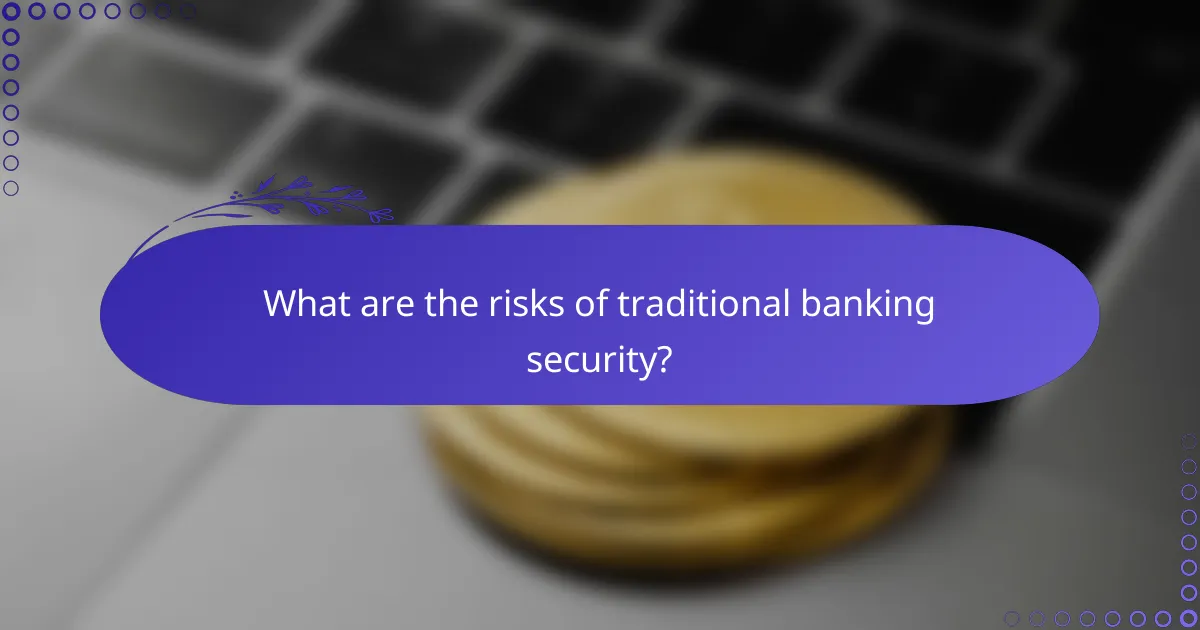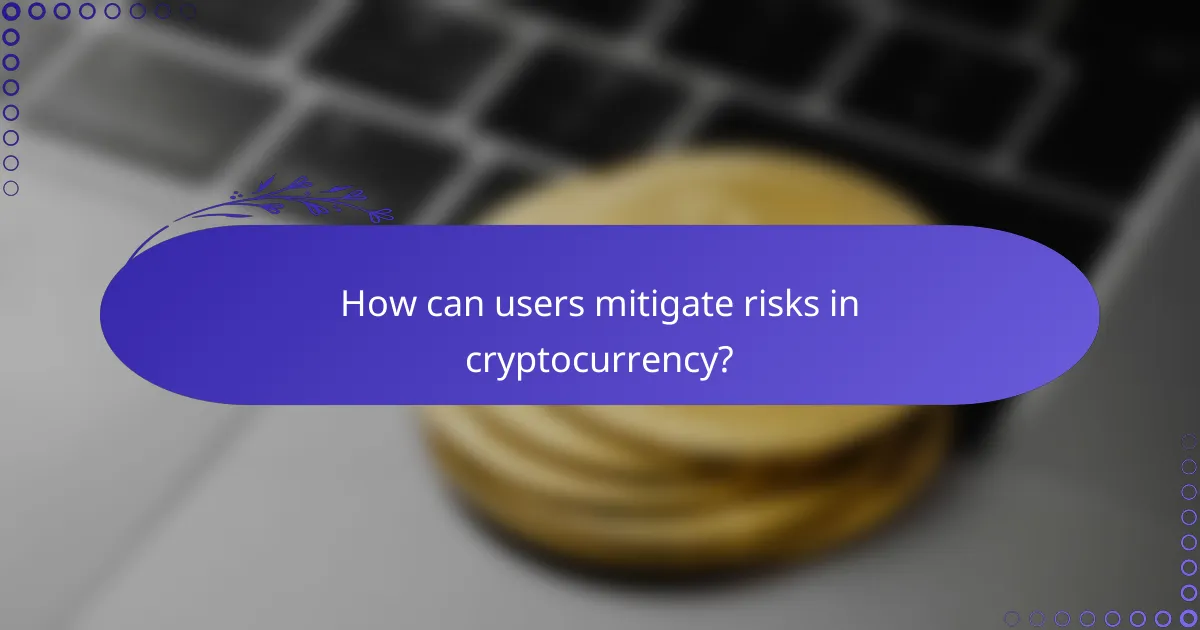Cryptocurrency offers significant security advantages over traditional banking by leveraging its decentralized architecture and advanced cryptographic techniques. These innovations not only enhance user privacy and control over personal assets but also minimize the risks of identity theft and fraud. With cryptocurrency wallets, users can securely store their digital assets, reducing vulnerabilities associated with centralized financial systems.

How does cryptocurrency enhance security compared to traditional banking?
Cryptocurrency enhances security compared to traditional banking primarily through its decentralized nature, advanced cryptographic techniques, and immutable ledgers. These features collectively reduce vulnerabilities associated with centralized systems, ensuring greater protection for users’ assets and transactions.
Decentralization reduces single points of failure
Decentralization means that cryptocurrency networks operate on a distributed ledger across numerous nodes, rather than relying on a single central authority. This structure minimizes the risk of a single point of failure, which is common in traditional banking systems where a central server can be targeted for attacks.
For example, if a bank’s central server is compromised, customer data and funds could be at risk. In contrast, a decentralized network like Bitcoin distributes data across thousands of computers, making it significantly harder for hackers to manipulate or steal information.
Cryptographic techniques ensure transaction integrity
Cryptocurrency transactions are secured through cryptographic techniques that verify the authenticity and integrity of each transaction. This process involves the use of public and private keys, which ensure that only the rightful owner can access and transfer their assets.
For instance, when a user initiates a transaction, it is signed with their private key, creating a unique cryptographic signature. This signature is then verified by network participants, ensuring that the transaction has not been altered and is legitimate, thus providing a higher level of security than traditional banking methods.
Immutable ledgers prevent fraud
Immutable ledgers, a core feature of blockchain technology, ensure that once a transaction is recorded, it cannot be altered or deleted. This characteristic significantly reduces the potential for fraud, as all transactions are transparent and publicly accessible on the blockchain.
In traditional banking, records can be manipulated or erased, leading to potential fraud cases. However, in a cryptocurrency network, any attempt to change a transaction would require altering every subsequent block in the chain, which is practically impossible due to the consensus mechanisms in place.

What are the key security benefits of cryptocurrency?
Cryptocurrency offers several key security benefits compared to traditional banking, primarily through its decentralized nature and advanced cryptographic techniques. These features enhance user privacy, reduce the risk of identity theft, and provide individuals with greater control over their personal assets.
Enhanced privacy through pseudonymity
Cryptocurrency transactions are pseudonymous, meaning that while transaction details are recorded on a public ledger, the identities of the users involved are not directly linked to their wallet addresses. This provides a layer of privacy that traditional banking systems, which require personal identification, do not offer.
Users can take additional steps to enhance their privacy, such as using privacy-focused cryptocurrencies like Monero or employing mixing services that obscure transaction trails. However, it is essential to be aware of the legal implications of such practices in your jurisdiction.
Lower risk of identity theft
With cryptocurrencies, users do not need to provide sensitive personal information, such as Social Security numbers or bank account details, which are often targeted by identity thieves. This significantly lowers the risk of identity theft compared to traditional banking systems.
To further protect against identity theft, individuals should use strong, unique passwords for their cryptocurrency wallets and enable two-factor authentication. Regularly updating security measures can also help safeguard assets from potential threats.
Control over personal assets
Cryptocurrency allows individuals to have complete control over their assets without relying on intermediaries like banks. Users can store their cryptocurrencies in personal wallets, which reduces the risk of loss due to bank failures or government seizures.
However, this control comes with the responsibility of securing private keys. Losing access to a private key can result in permanent loss of funds. Therefore, it is crucial to use secure storage methods, such as hardware wallets, and to keep backups in a safe location.

How do cryptocurrency wallets improve security?
Cryptocurrency wallets enhance security by allowing users to store their digital assets in a way that minimizes the risk of theft and fraud. Unlike traditional banking, where funds are stored in centralized accounts, wallets can utilize various methods to protect assets from unauthorized access.
Cold storage protects against online threats
Cold storage refers to keeping cryptocurrency offline, which significantly reduces exposure to online threats such as hacking and phishing. By storing private keys on hardware devices or paper wallets, users can safeguard their assets from cybercriminals who target online accounts.
For example, hardware wallets like Ledger or Trezor store keys in a secure environment, making it nearly impossible for hackers to access them remotely. This method is especially recommended for long-term investors who do not need immediate access to their funds.
Multi-signature wallets add extra layers of security
Multi-signature wallets require multiple private keys to authorize a transaction, adding an additional layer of security. This setup ensures that even if one key is compromised, unauthorized transactions cannot occur without the other keys.
For instance, a multi-signature wallet might require three out of five keys to approve a transaction. This is particularly useful for businesses or groups managing shared funds, as it prevents any single individual from having complete control over the assets.

What are the risks of traditional banking security?
Traditional banking security faces several risks, primarily due to centralized systems and regulatory requirements that can compromise user data. These vulnerabilities can lead to significant financial losses and privacy breaches for customers.
Centralized systems are vulnerable to hacks
Centralized banking systems store customer data in a single location, making them prime targets for cyberattacks. Hackers can exploit weaknesses in these systems to gain access to sensitive information, leading to identity theft and financial fraud.
For example, large-scale data breaches have occurred at several major banks, exposing millions of customer records. Such incidents highlight the importance of robust cybersecurity measures and the inherent risks of relying on centralized infrastructures.
Regulatory compliance can expose user data
Regulatory compliance in traditional banking often requires institutions to collect and store extensive personal information from customers. This data can be vulnerable to unauthorized access, especially if the bank’s security measures are inadequate.
In regions like the European Union, regulations such as the General Data Protection Regulation (GDPR) mandate strict data handling practices. While these laws aim to protect user privacy, they can inadvertently increase the risk of exposure during compliance audits or data sharing with third parties.

How can users mitigate risks in cryptocurrency?
Users can mitigate risks in cryptocurrency by adopting secure storage methods and implementing additional security measures. Key strategies include using hardware wallets for offline storage and enabling two-factor authentication for account protection.
Utilizing hardware wallets for storage
Hardware wallets are physical devices that securely store cryptocurrency offline, significantly reducing the risk of hacking. Unlike online wallets, which are vulnerable to cyber attacks, hardware wallets keep private keys isolated from the internet.
When choosing a hardware wallet, consider reputable brands such as Ledger or Trezor, which offer robust security features. Ensure you purchase directly from the manufacturer to avoid counterfeit devices.
Implementing two-factor authentication
Two-factor authentication (2FA) adds an extra layer of security by requiring a second form of verification in addition to your password. This could be a text message code, an authentication app, or a hardware token.
To set up 2FA, enable it on all cryptocurrency exchanges and wallets that support it. Avoid using SMS-based 2FA when possible, as it can be susceptible to interception; instead, opt for authenticator apps like Google Authenticator or Authy for better security.

What role do regulations play in cryptocurrency security?
Regulations play a crucial role in enhancing the security of cryptocurrency by establishing standards that protect users and promote trust in the ecosystem. They help mitigate risks associated with fraud, theft, and market manipulation, creating a safer environment for investors and users alike.
Regulatory frameworks enhance user protection
Regulatory frameworks provide guidelines that cryptocurrency exchanges and platforms must follow to ensure user safety. These regulations often require platforms to implement robust security measures, such as two-factor authentication and regular audits, which help safeguard user funds.
For example, in the European Union, the Markets in Crypto-Assets (MiCA) regulation aims to create a comprehensive regulatory framework that enhances user protection while fostering innovation. Such regulations can significantly reduce the likelihood of security breaches and increase user confidence.
Compliance can improve trust in platforms
When cryptocurrency platforms comply with established regulations, they signal to users that they prioritize security and transparency. This compliance can lead to increased trust, as users are more likely to engage with platforms that adhere to recognized standards.
Platforms that undergo regular compliance checks and are transparent about their security practices often attract more users. For instance, exchanges that are licensed and regulated in jurisdictions like the United States or the United Kingdom typically have higher user trust levels compared to unregulated platforms.

What emerging trends are shaping cryptocurrency security?
Emerging trends in cryptocurrency security focus on advanced technologies and regulatory frameworks that enhance the safety of digital assets. Innovations such as decentralized finance (DeFi) protocols, multi-signature wallets, and blockchain analytics are becoming increasingly important in addressing security challenges.
Decentralized finance (DeFi) protocols
DeFi protocols are reshaping how users interact with financial services by eliminating intermediaries. This decentralization reduces the risk of single points of failure, as assets are distributed across multiple nodes. However, users must remain vigilant about smart contract vulnerabilities and ensure they use reputable platforms.
Multi-signature wallets
Multi-signature wallets require multiple private keys to authorize a transaction, enhancing security by preventing unauthorized access. This method is particularly useful for organizations or individuals managing significant amounts of cryptocurrency. Users should consider setting up multi-signature wallets to protect against theft and loss.
Blockchain analytics
Blockchain analytics tools help identify suspicious activities and enhance compliance with regulations. By analyzing transaction patterns, these tools can detect fraud and money laundering attempts. Users should leverage these analytics to monitor their transactions and ensure they adhere to local regulations, which may vary by country.
